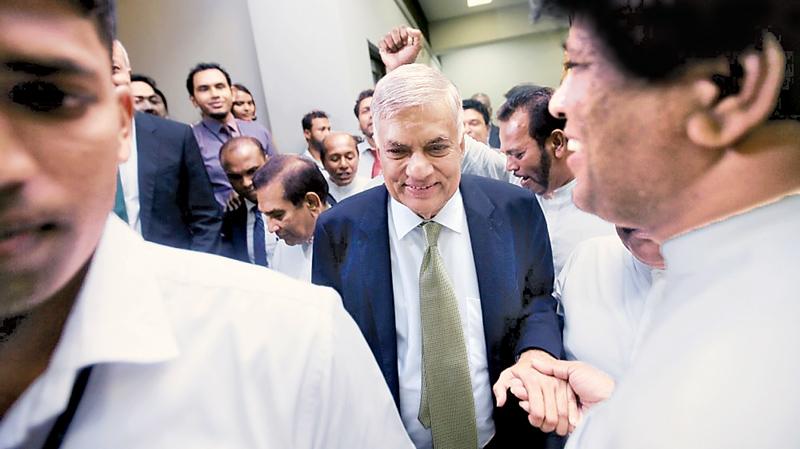
There are lessons to be learnt from the debate and the final vote count on Wednesday, April 4. There were three responses during the count. Pakshai , Virudhai; and Absent. The word ‘absent’ is now in the Sinhala vocabulary.
 Staying away is now a form of political statement. It is more than that. It is subterfuge and deceit at its most eloquent.
Staying away is now a form of political statement. It is more than that. It is subterfuge and deceit at its most eloquent.
Our problem is our inability to understand how politicians see the road ahead. They don’t use a rear view mirror. They don’t need to watch where they are headed to. They don’t remember where they have been.
If the reader understands this bit of convoluted wisdom, he or she would have no problem in deciphering the expositions of Susil Premjayanth and S.B. Dissanayake the two outstanding trapeze artists of last Wednesday’s circus.
The point is to change the system
Philosophers have interpreted the world in various ways, said Karl Marx. ‘The point was to change it.’
Venerable Maduluwawe Sobhitha thero was someone who attempted such change. He was a barefoot prophet. He relied on two emissaries
Maithripala Sirisena and Ranil Wickremesinghe.
The two were not ready to wade in barefoot. Maithri has put on Sinhala nationalist moccasins. Ranil has opted for neoliberal boots. Give the devil his due. Mahinda is barefoot and walks in the opposite direction.
Yahapalanaya was a movement. Over three years, it turned in to a business. We have eighteen months remaining to make it again a movement. Failure to make it a movement will make it a swindle in history.
The real and moral
Politicians are realists and not moralists. To us ordinary, little people, conscience is what keeps us awake at night. Not so, if you are in the business of politics. Politicians sleep well. They all slept well on Wednesday night.
Conscience, as the German thinker Nietzsche said, is a fake adornment used by little people trying to come to terms with superior people in their midst. It is those superior people who practise the craft of politics.
Ranil will be committing a grave error, if he considers Wednesday’s vote as a win. It was at best an engineered survival. If he is elated by the noise of the crackers paid for by the party, his elation will be at his own peril.
Cronyism is a phenomenon that is as old as the discipline of modern economics. Adam Smith, the intellectual founder of modern free-market economics, famously called the economic system he advocated “the obvious and simple system of natural liberty.”
What he called natural liberty was applicable, especially, to the non-elite who are represented by the Range Bandaras.
Robust economic growth offered the only way out and the means of creating opportunities for the less advantaged members of society. The trick is to convince them by speaking their language. Ranil has 18 months left to find people who speak with coherence the language that they understand.
A reprieve, not a win
It is a reprieve and not a victory for Prime Minster Ranil Wickremesinghe. The rainbow collation of January 8, 2015 is not dead but in a state of hibernation. It can be resuscitated by a credible leadership. At present, that excludes any leading light in the current firmament.
No Tamil or Muslim parliamentarian voted for the no confidence motion. The minorities do not want a return of the Rajapaksa tribe.
If the SLFP continues on this duplicitous path, it will not merely be divided, it will wither away as a political party, ceding ever-more ground to the dangerous Pohottuwa. After Wednesday’s vote, without serious negotiations and genuine will on part of both main parties to re-establish a working relationship, the national government will be reduced to fiction. It is convoluted logic for SLFPers who voted for the motion, to decide to remain in Cabinet headed by the Prime Minister and presided over by the President.
The defeat of the no confidence motion is not a win for either Wickremesinghe or his party. It is only a reprieve and not a final resolution of its internal crisis.
The ousted tyranny lurks close, breathing down our necks hurting memory, tormenting emotion and spoiling our mood.
Lessons of Dunkirk
If Ranil is prudent and prescient, he will regard his parliamentary survival on Wednesday night as his Dunkirk moment. By doing so, he will be able to trace a Churchillian path towards the abolition of the executive presidency, honest to goodness power devolution and purposeful national reconciliation.
Dunkirk was the unplanned turning point that allowed Britain to recover from its humiliating defeat and withdrawal in the face of Hitler’s advancing army. Dunkirk represents both – abyss of despair and a fountain of hope and courage.
British troops trapped between the Nazi juggernaut and the Channel were saved in a massive evacuation by sheer grit and enormous luck.
The success of the evacuation was a morale booster. It allowed beleaguered Britain, time and space to recover and finally defeat Nazi tyranny.
What happened in Parliament on Wednesday night was such an evacuation of troops. In case they notice, it helped identify enemy infiltrators.
Blunders and miscalculations
Novelist J.B. Priestley was a BBC reporter on the beaches of Dunkirk. ‘What began as a miserable blunder, a catalogue of misfortunes and miscalculations, ended as an epic of gallantry.’ A fitting summing up of the past three years of Yahapalanaya!
On Wednesday night our miserable blunders, miscalculations and misfortunes ended when the good sense of the UNP rebels prevailed over their anger and disillusionment. Their gallantry of purpose overcame their reticence of the leader’s shortcomings.
The promoters of the motion knew that SLFP defectors alone could not do the trick. UNP dissidents were a vital component of the equation.
Evident, seeming and obvious
The motion of no confidence was evidently aimed at the Prime Minister. It was seemingly condemnatory of the Bond scam. It was obviously intended to change the composition of the government.
The grand hoopla created by its architects, sponsors and wanna-be legatees is irrefutable proof of Mahinda’s mastery over popular imagination.
Mahinda Rajapaksa having won the war proceeded to remodel our socio-economic and political structures. He converted impersonal institutions that trace their origins to the time when universal franchise was introduced in to extractive agencies, managed as personal fiefdoms. Kinship and friendship determined political allegiance.
The Yahapalanaya successors found the proposition too seductive to dismantle. They foolishly attempted to replace existing kinships and friendships with their own.
Remaining eighteen months
In the remaining eighteen months, the government cannot do what it failed to do in the past three years. That said, it can by exploiting this Dunkirk moment, outwit the tyrant by opening a second front in the form of credible investigations and prosecutions of crimes that the Rajapaksa regime committed.
These are the crimes that everybody talks about, yet, nobody seems anxious to do anything about. Lasantha. Prageeth. Thajudeen. Yet, in the last two weeks, there are signs of movement in these emblematic cases of Rajapaksa excess and brutality, with a sudden spate of arrests and the Supreme Court refusing to grant freedom from arrest in the case of high officials under criminal investigation for abduction and murder.
A Cabinet not exceeding 30, that excludes national list members who cannot claim exceptional competence and achievements would help regain credibility.
At this point in time, the restoration of credibility, steadfastness and political will and earnestness to fulfil the 2015 mandate for change, will be key to reawakening the reformist constituencies of January 8 ahead of the elections in 2019 and 2020.
